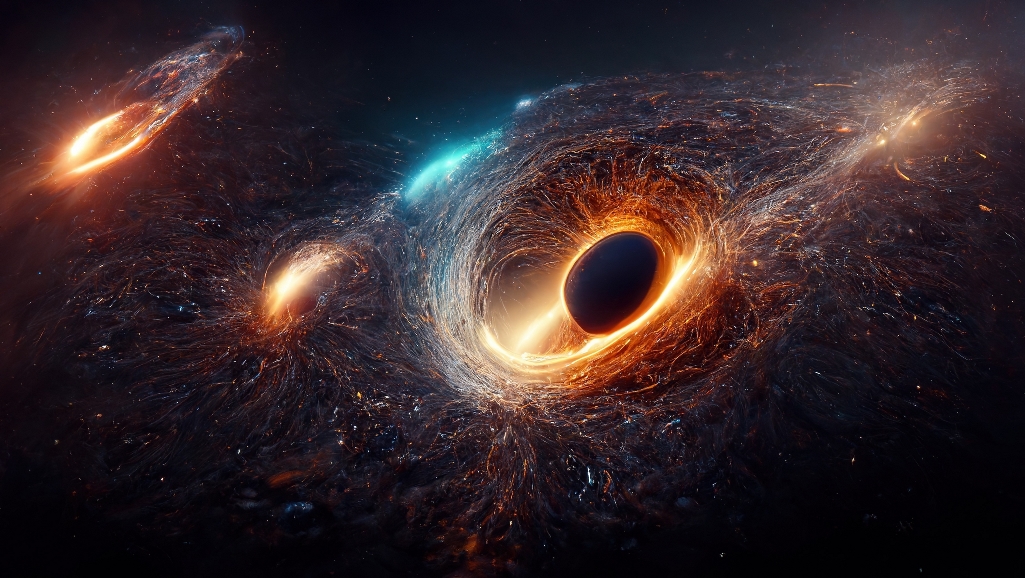
A new study claims our universe is expanding at a rapid rate: What is the reason?
Our universe is undergoing an accelerating expansion, a phenomenon acknowledged by all cosmological theories yet remains inadequately explained. A recent theoretical study proposes a captivating solution: the continuous collision and absorption of "baby" parallel universes might be contributing to the expansion.
Examinations of the cosmic microwave background, the lingering radiation from the Big Bang, indicate that our universe is undergoing accelerated expansion. To reconcile this observation with the prevailing theory of cosmic evolution, known as the Standard Cosmological Model, physicists introduce the concept of dark energy—an elusive substance assumed to propel the expansion.
However, since dark energy does not manifest in any other detectable way, numerous astrophysicists question its existence and explore alternative explanations for the universe's expansion.
In a study published on December 12, 2023, in the Journal of Cosmology and Astroparticle Physics, scientists propose a novel idea: the universe's expansion may be driven by its continual merging with other universes.

"The primary outcome of our research is that the mysterious dark energy causing the accelerated expansion of our universe might find a simple and intuitive explanation—merging with so-called baby universes. This model might align better with the data than the standard cosmological model," explained Jan Ambjørn, the lead author of the study and a physicist at Copenhagen University, in an email to LiveScience.
Swallowing cosmic 'babies'
While the concept of multiple universes interacting with ours is not a new idea, this study takes a step further by developing a mathematical model to explore the potential impact of such interactions on the evolution of our universe. The researchers' calculations suggest that the merging of our universe with others should lead to an increase in its volume, a phenomenon that might be perceived by our instruments as an expansion.
Additionally, the scientists used their theoretical framework to compute the rate of the universe's expansion. They claim that their calculations align more closely with observational data than the traditional Standard Cosmological Model.
The proposed theory also offers an explanation for the puzzle of cosmological inflation—the rapid expansion that occurred in the early moments of the universe. While physicists have previously attributed this expansion to the presence of "the inflaton," a hypothetical field causing ultra-rapid expansion after the Big Bang, the new study suggests an alternative. The authors propose that this early rapid expansion could have resulted from our young universe being absorbed by a larger one.
The researchers wrote in their paper, "The fact that the Universe has expanded … in a very short time invites the suggestion that this expansion was caused by a collision with a larger universe, [that is] it was really our Universe which was absorbed in another 'parent' universe." They highlight the intriguing aspect that such a scenario eliminates the need for an inflaton field.
According to the scientists, after absorption, our newly enlarged universe continued to collide with other "baby universes" and incorporated them as well.
While this theory addresses key challenges in modern cosmology, its validation relies on observational data. Ongoing experiments studying the properties of the microwave background may provide answers to these fundamental questions in the near future.
Yoshiyuki Watabiki, a physicist at the Tokyo Institute of Technology, expressed optimism, stating, "Our late-time expansion of the Universe is different from the standard cosmological predictions, and we believe that observations from the Euclid telescope and the James Webb telescope will settle which model best describes the present-time expansion of our Universe," in an interview with Live Science.
- Related News
- Perseverance finds rock on Mars with signs of life on Earth (photo)
- On 25th anniversary of Chandra telescope, NASA released 25 photos previously unseen by the public
- Rare intermediate-mass black hole has been discovered at the center of our galaxy
- Stone "snowman" and pure sulfur crystals on Mars։ Remarkable discoveries by Perseverance and Curiosity
- When will humanity settle on Mars? Interview with Gernot Grömer
- TESS telescope discovers super-hot exoplanet the size of Neptune
- Most read
month
week
day
- Buyers massively complain about Samsung's Galaxy Buds 3 and Buds 3 Pro headphone, even finding hair in the box 820
- With today's mortgage interest rates, banks simply cannot sell products in 2025: Interview with Vardan Marutyan 811
- Ants and bees 'taught' tiny drones to navigate without GPS, beacons or lidars 675
- Samsung will release Galaxy Tab S10+ and Ultra tablets and Galaxy Z Fold 6 Slim and Galaxy w25 smartphones in October 640
- Mass production of iPhone SE 4 will begin this October, with sales starting in 2025 599
- Insider unveils specs of all smartphones of iPhone 17 series, including the 17 Slim 595
- Telegram's monthly active audience reaches 950 million 585
- What dangers can feature phones from unknown manufacturers conceal? 553
- For the first time in history, iPhone will get a Samsung camera 552
- Next iPhone SE may have powerful A18 chip and Apple Intelligence AI functions 546
- Archive
